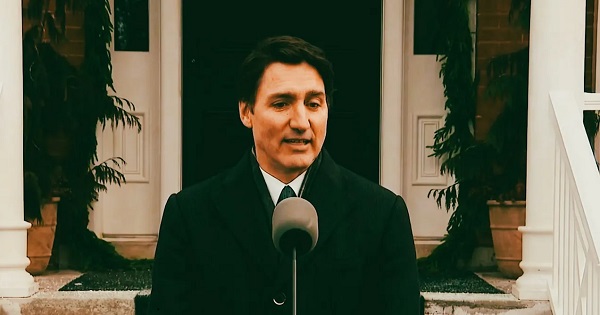espionage
Non-citizens could choose Canada’s next prime minister thanks to Liberal Party rules

From LifeSiteNews
Liberals have refused to change their membership rule which allow non-citizens to vote in leadership races despite concerns that this could lead to foreign interference in selecting a prime minister to replace Trudeau
The Liberal Party has refused to change their membership rules for the upcoming leadership race, meaning Canada’s next prime minister could effectively be chosen by non-Canadians.
On January 7 the Liberals confirmed that their membership rules allowing non-citizens to vote in leadership races will remain intact despite concerns that this could lead to foreign interference in selecting a prime minister to replace Justin Trudeau, who has announced he is stepping down.
According to information shared with CBC News, the Liberal Party “doesn’t intend to change or reinterpret rules in its 2016 constitution that Elections Canada has suggested could make the vote be at least as vulnerable to such efforts as previous leadership races.”
Following Trudeau’s resignation, the Liberal Party is preparing for a leadership race. In addition to being the new Liberal leader, the winning candidate will automatically serve as prime minister at least until an election is held, which could be as late as October.
Currently, the Liberal Party rules do not require proof of Canadian citizenship to join the party, but only that the person “ordinarily live[s] in Canada or, for Canadians living abroad, be qualified as an elector who may vote in accordance with part 11 of the Canada Elections Act.”
Additionally, while voters must by 18 years-old to participate in the Federal Election, voters as young as 14-years-old can participate in the Liberal’s leadership race provided they “support the purposes of the Party.”
Many have pointed out that the loose rules will allow any number of non-citizens, from China, India, Russia or any part of the world, to effectively help select the interim prime minister.
According to Statistics Canada, there are now more than three million non-permanent residents living in Canada who are eligible to vote for the new Liberal leader and consequently, the prime minister.
Even some Liberal MPs have called for more strict rules to safeguard the upcoming leadership race, noting the potential dangers of their open policy.
The concerns regarding the integrity of the upcoming leadership race come after more than a year of evidence has been submitted to indicate foreign interference took place in the 2019 and 2021 federal elections. In fact, reports show that China bragged it meddled in 41 candidates’ campaigns in Canada’s 2019 election, which saw Trudeau’s Liberal government re-elected to a second term.
In response to foreign interference claims, the Foreign Interference Commission was convened in late 2023 to “examine and assess the interference by China, Russia, and other foreign states or non-state actors, including any potential impacts, to confirm the integrity of, and any impacts on, the 43rd and 44th general elections (2019 and 2021 elections) at the national and electoral district levels.”
The commission is headed by Justice Marie-Josée Hogue, who had earlier said she and her lawyers will remain “impartial” and will not be influenced by politics. In January 2024, Hogue said that she would “uncover the truth whatever it may be.”
As reported by LifeSiteNews, documents from a federal inquiry looking at meddling in Canada’s past two elections by foreign state actors show that agents of the CCP allegedly worked at Elections Canada polling centers during the 2021 campaign.
To date, Trudeau has been coy and has never explicitly stated whether he was ever told by the Canadian Security Intelligence Service (CSIS) that CCP agents’ actions were in breach of the nation’s Elections Act.
A few months ago, the head of Canada’s intelligence agency testified under oath that he gave Trudeau multiple warnings that agents of the CCP were going after Conservative MPs, yet the prime minister has denied receiving these warnings.
conflict
Iran nuclear talks were ‘coordinated deception’ between US and Israel: report

From LifeSiteNews
Reports state that U.S. peace talks were a ruse and that Trump gave Netanyahu a ‘green light’ to hit Iran’s nuclear and military sites, killing top commanders.
A senior Israeli official told the Jerusalem Post that Tel Aviv and Washington worked together to convince Tehran that diplomacy was still possible after Israel was ready to attack Iran. Just hours before Israel’s massive assault began, President Donald Trump maintained he was still committed to talks.
The Israeli outlet reports, “The round of U.S.-Iranian nuclear negotiations scheduled for Sunday was part of a coordinated U.S.-Israeli deception aimed at lowering Iran’s guard ahead of Friday’s attack.”
READ: Israel strikes Iran’s nuclear sites, kills top commanders in massive air assault
In a post on Truth Social shortly before the Israeli strikes began, Trump declared that “We remain committed to a Diplomatic Resolution to the Iran Nuclear Issue! My entire Administration has been directed to negotiate with Iran. They could be a Great Country, but they first must completely give up hopes of obtaining a Nuclear Weapon. Thank you for your attention to this matter!”
After the Israeli attack was in progress, Secretary of State Marco Rubio denied that the U.S. was involved. However, American officials have said the White House was aware Israel was set to begin striking Iran, with Trump telling Fox News he was briefed on the operation.
Barak Ravid of Axios, moreover, later reported that Tel Aviv was given “a clear U.S. green light” to start bombing, citing two unnamed Israeli officials.
Sources speaking with Axios said the perceived split between Trump and Israeli Prime Minister Benjamin Netanyahu was coordinated behind the scenes. “Two Israeli officials claimed to Axios that Trump and his aides were only pretending to oppose an Israeli attack in public – and didn’t express opposition in private,” the report explained. “The goal, they say, was to convince Iran that no attack was imminent and make sure Iranians on Israel’s target list wouldn’t move to new locations.”
The sources said that Trump and Netanyahu discussed the attack during a phone call on Monday. After the call, reports said Trump pressed Netanyahu not to attack Iran, but that was another effort to deceive Iran.
In a second post following the attack, Trump said he gave Iran the opportunity to make a deal, and suggested that Israel used American weapons in the massive air raid. “I gave Iran chance after chance to make a deal. I told them, in the strongest of words, to ‘just do it,’ but no matter how hard they tried, no matter how close they got, they just couldn’t get it done,” the president wrote.
The post continued, “I told them it would be much worse than anything they know, anticipated, or were told, that the United States makes the best and most lethal military equipment anywhere in the World, BY FAR, and that Israel has a lot of it, with much more to come – And they know how to use it.”
The U.S. and Iran began negotiations on establishing a new nuclear agreement in April, with the two sides engaging in five rounds of Omani-mediated talks. At times, a deal appeared possible, with Iranian officials saying the dialogue was leading to progress. A sixth round of talks was scheduled for Sunday, but now appears unlikely.
A second source speaking with the Jerusalem Post said the goal of Israel’s military operations was not the complete destruction of Iran’s nuclear facilities, but rather to hit missile sites and top Iranian leaders to bring down the government.
Israel has conducted several rounds of strikes so far, hitting nuclear facilities, residential buildings in Tehran, and military sites. Iran has confirmed that several military leaders and nuclear scientists were killed in the bombing.
espionage
FBI Director: CCP Behind Wave of Pathogen Smuggling as Third Chinese Student Charged in Michigan Lab Probe

 Sam Cooper
Sam Cooper
“In a follow up interview with FBI and ICE HSI agents, Han admitted to sending the packages and lying about their contents”
In an intensifying pattern of national security investigations targeting unauthorized biological shipments from China into Detroit, U.S. authorities on Monday confirmed the arrest of a third Chinese national allegedly involved in smuggling undeclared bio-materials into the United States—this time for use at a University of Michigan laboratory.
“This case is part of a broader effort from the FBI and our federal partners to heavily crack down on similar pathogen smuggling operations, as the Chinese Communist Party works relentlessly to undermine America’s research institutions,” FBI Director Kash Patel posted to X on Monday evening.
The latest defendant, Chengxuan Han, is a citizen of the People’s Republic of China and a doctoral student at the College of Life Science and Technology in Wuhan. She has been charged with smuggling goods into the U.S. and making false statements, according to a federal criminal complaint filed in U.S. District Court in Detroit.
From September 2024 through March 2025, prosecutors allege, Han sent four international shipments containing concealed biological materials to individuals affiliated with a University of Michigan lab. The contents were identified as Caenorhabditis elegans — roundworms commonly used in genetic and biomedical research. The packages were mis-manifested and not declared in accordance with U.S. import regulations.
On June 8, Han arrived at Detroit Metropolitan Airport on a J-1 visa and was stopped by U.S. Customs and Border Protection officers. She allegedly denied having sent any biological materials to the U.S. and made false statements about the nature of the shipments. Agents also discovered that content on her electronic device had been deleted three days before her arrival — a detail included in the federal complaint.
“In a follow up interview with FBI and ICE HSI agents, Han admitted to sending the packages and lying about their contents,” Patel commented.
“The alleged smuggling of biological materials by this alien from a science and technology university in Wuhan, China — to be used at a University of Michigan laboratory — is part of an alarming pattern that threatens our security,” said U.S. Attorney Jerome F. Gorgon, Jr. “The American taxpayer should not be underwriting a PRC-based smuggling operation at one of our crucial public institutions.”
The case marks the third time in one week that Chinese nationals connected to the University of Michigan have been charged with allegedly smuggling undeclared biological material from China into the U.S. for laboratory research.
On June 3, federal prosecutors charged Yunqing Jian, 33, a postdoctoral fellow at the University of Michigan, and her boyfriend, Zunyong Liu, 34, with conspiracy, smuggling goods into the U.S., false statements, and visa fraud. Jian and Liu are accused of importing Fusarium graminearum — a fungus considered in some scientific literature to be a potential agroterrorism threat — into the country without proper declaration.
Officials allege Liu, who conducts research on the same pathogen at a university in China, initially lied to investigators but later admitted to smuggling the fungus for research in Jian’s Michigan lab.
The Bureau is a reader-supported publication.
To receive new posts and support my work, consider becoming a free or paid subscriber.









